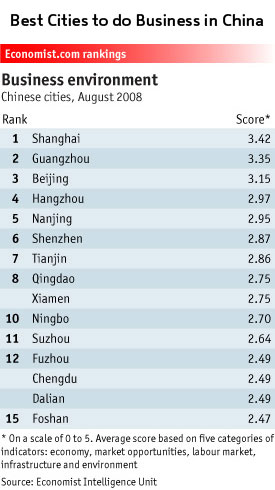Need for Relationships is Different in China; Avoiding Joint Ventures SCDigest Editorial Staff | SCDigest Says: |  Investing time and effort in building long-term relationships in China is essential for success there, experts say – and that includes the Chinese government . Investing time and effort in building long-term relationships in China is essential for success there, experts say – and that includes the Chinese government .

Click Here to See Reader Feedback | The growth of China, both as a supply base and potential source of market expansion, over the last 10 years or more has been phenomenal. But navigating the complexities of buying from or selling into China has never been easy, especially as the pace of change there is almost mind-boggling. Still, the companies that have been doing business in China for many years have learned a number of lessons that can benefit others that have more recently made the move or are considering expanding their buy or sell efforts. Many of those lessons were discussed during a recent conference at Arizona State University and co-sponsored by AT Kearny, including a panel discussion that featured executives from Motorola, Emerson Electric, Harley-Davidson, ON Semiconductor and TPI Composites, as well as ASU faculty members. Those lessons are summarized below: Leave your "Cutting Edge" Technology Behind: "Hit-and-miss IP regulation is a significant inhibitor to development in China," said W. P. Carey School supply chain management professor Philip Carter. But companies shouldn't ignore China due to the IP risks, but rather go into China with older, "second best" technologies that present lower risks to the company if the IP is ripped off.
However, it is worth noting that IP protection in China has become better and likely will continue to improve. That's in large part because as Chinese companies themselves continue to move up the value chain, they also will be looking for greater protection of their IP. In fact, in 2007, China's Premier Wen Jiabao said, "The competition of the future world ... is the competition of Intellectual Property Rights." Focus on Recruiting and Retaining Management Talent: Finding basic factory and unskilled labor in China is easy, but supervisory and management talent is a lot harder to come by – yet, that management talent is obviously key to success. "You need to have people on the ground in China who can interact with the government and move quickly," said Peter Yam of Emerson Electric. "Delegate decision-making to people on the ground -- to senior executives who are actually based in China." Companies must invest in finding good managers and keeping salaries and opportunities attractive, and keep a strong and consistent focus on middle and upper management staffing.
Understand the Importance of Relationships: Relationships are different and arguably more important in China than in Western economies. The Chinese term guanxi, meaning "connections," is indicative of the role that relationships play in Chinese business. Investing time and effort in building long-term relationships in China is essential for success there, experts say – and that includes the Chinese government.  "Our great relationships with the Chinese government have been critical," said Ronald Hutchinson of Harley-Davidson at the conference. "The ultimate authority over a company's success in China is the government, and there's always a veiled threat of retaliation -- that's why building relationships is so important." "Our great relationships with the Chinese government have been critical," said Ronald Hutchinson of Harley-Davidson at the conference. "The ultimate authority over a company's success in China is the government, and there's always a veiled threat of retaliation -- that's why building relationships is so important."
One risk: understanding when you might be crossing the line in terms of corruption or related issues in China itself or your home country's laws, especially as bribery and anti-corruption laws in China continue to change rapidly. It is also important to work hard to really understand the Chinese culture and embrace its reality. Many companies have failed by trying to fight those cultural differences. Think Sell, not Just Buy: While making products in China either directly or indirectly for export back to Western markets can dramatically reduce costs, companies must really look at entering the domestic Chinese market as well, despite the challenges, those with experience there say. This is again where relationships with government officials is key, as it may smooth the way to joint ventures and even 100% ownership by Western companies of businesses in China, as Motorola was able to achieve with its operations there. But beyond the ownership and regulatory challenges, Western companies must also work very hard to understand China's heterogeneous market, experts say, though that is not easy given the relative lack of publicly available information. Procter & Gamble, for example, has hired hundreds of research managers living with Chinese families in cities and on farms to learn how they use everything from detergent to toothpaste, habits that can vary dramatically from region to region. Be Careful with Joint Ventures: While, in many cases, a joint venture with a Chinese company may be the only path into China, such moves have to be done with care and the right strategy to avoid creating a competitor and losing IP. "The best model to incorporate in China is a wholly-owned subsidiary of the American or multinational company," says Gary Took of Motorola. However, in some cases, the only deal that can be struck is a joint venture. In that case, ensure you have a majority stake, and that there is a clear path to increasing that share. The experts also advised against forming a joint venture with a Chinese competitor. Look for Win-Win: Companies likely will find more success in China if they look for opportunities that are not only good for their companies, but also good for China. That's a different approach than is needed in the West – but may be the key to building relationships with government officials and accelerating official approval for new plans and development. |
No comments:
Post a Comment